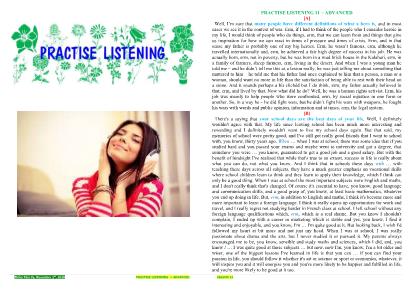Bài thực hành nghe Tiếng Anh nâng cao - Bài 11 - Thẩm Tâm Vy - Năm 2018 (Có âm thanh)
Bạn đang xem tài liệu "Bài thực hành nghe Tiếng Anh nâng cao - Bài 11 - Thẩm Tâm Vy - Năm 2018 (Có âm thanh)", để tải tài liệu gốc về máy bạn click vào nút DOWNLOAD ở trên

Thẩm Tâm Vy, November 1st, 2018 PRACTISE LISTENING ~ ADVANCED LESSON 11 PRACTISE LISTENING 11 ~ ADVANCED [A] Well, I’m sure that many people have different definitions of what a hero is, and in most cases we see it in the context of war. Erm, if I had to think of the people who I consider heroic in my life, I would think of people who do things, erm, that we can learn from and things that give us inspiration for how we can react in times of pressure and times of crisis. Erm, and in that sense my father is probably one of my big heroes. Erm, he wasn’t famous, erm, although he travelled internationally and, erm, he achieved a fair high degree of success in his job. He was actually born, erm, not in poverty, but he was born in a mud brick house in the Kalahari, erm, in a family of farmers, sheep farmers, erm, living in the desert. And when I was a young man he told me – and he didn’t tell me this as a lesson really, he was just telling me about something that mattered to him – he told me that his father had once explained to him that a person, a man or a woman, should want no more in life than the satisfaction of being able to rest with their head on a stone. And it sounds perhaps a bit clichéd but I do think, erm, my father actually believed in that, erm, and lived by that. Now what did he do? Well, he was a human rights activist. Erm, his job was mainly to help people who were confronted, erm, by social injustice in one form or another. So, in a way he – he did fight wars, but he didn’t fight his wars with weapons, he fought his wars with words and public opinion, information and at times, erm, the legal system. [B] There's a saying that your school days are the best days of your life. Well, I definitely wouldn't agree with that. My life since leaving school has been much more interesting and rewarding and I definitely wouldn't want to live my school days again. But that said, my memories of school were pretty good, and I've still got really good friends that I went to school with, you know, thirty years ago. When when I was at school, there was some idea that if you studied hard and you passed your exams and maybe went to university and got a degree, that somehow you were you know, guaranteed to get a good job and a good salary. But with the benefit of hindsight I've realised that while that's true to an extent, success in life is really about what you can do, not what you know. And I think that in schools these days with with teaching these days across all subjects, they have a much greater emphasis on vocational skills where school children learn to think and they learn to apply their knowledge, which I think can only be a good thing. When I was at school the most important subjects were English and maths, and I don't really think that's changed. Of course it's essential to have, you know, good language and communication skills, and a good grasp of, you know, at least basic mathematics, whatever you end up doing in life. But, erm, in addition to English and maths, I think it's become more and more important to learn a foreign language. I think it really opens up opportunities for work and travel, and I really regret not studying harder in French class at school. I left school without any foreign language qualifications which, erm, which is a real shame. But you know I shouldn't complain, I ended up with a career in marketing which is stable and yes, you know, I find it interesting and enjoyable, and you know, I'm I'm quite good at it. But looking back, I wish I'd followed my heart at bit more and not just my head. When I was at school, I was really passionate about drama and the arts, but I never studied it or pursued it. My parents always encouraged me to be, you know, sensible and study maths and sciences, which I did, and, you know I I was quite good at those subjects but now, now I'm, you know, I'm a bit older and wiser, one of the biggest lessons I've learned in life is that you can if you can find your passion in life, you should follow it whether it's art or science or sport or economics, whatever, it will inspire you and it will energise you and you're more likely to be happier and fulfilled in life, and you're more likely to be good at it too.
Tài liệu đính kèm:
 bai_thuc_hanh_nghe_tieng_anh_nang_cao_bai_11_tham_tam_vy_nam.pdf
bai_thuc_hanh_nghe_tieng_anh_nang_cao_bai_11_tham_tam_vy_nam.pdf 01.LISTENING A (SLOW).mp3
01.LISTENING A (SLOW).mp3 02. LISTENING A (NORMAL).mp3
02. LISTENING A (NORMAL).mp3 03. LISTENING B (SLOW).mp3
03. LISTENING B (SLOW).mp3 04. LISTENING B (NORMAL).mp3
04. LISTENING B (NORMAL).mp3





